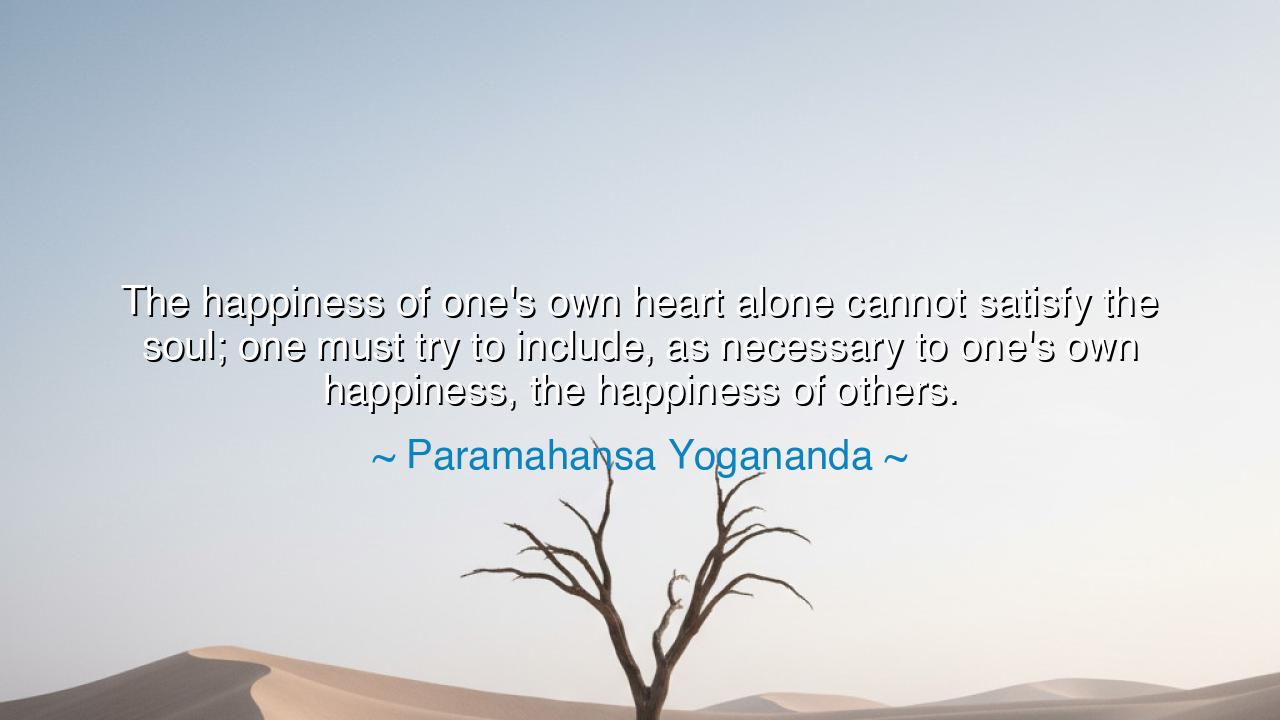
The happiness of one's own heart alone cannot satisfy the soul;
The happiness of one's own heart alone cannot satisfy the soul; one must try to include, as necessary to one's own happiness, the happiness of others.






“The happiness of one's own heart alone cannot satisfy the soul; one must try to include, as necessary to one's own happiness, the happiness of others.” — Paramahansa Yogananda
In these luminous words, Paramahansa Yogananda, the sage who bridged the wisdom of the East and West, reveals the sacred law of spiritual unity — that true joy cannot exist in isolation. For the soul is not a lonely flame but part of a boundless fire, and to seek happiness only for oneself is to deny its divine nature. When Yogananda speaks of the heart’s longing, he reminds us that individual joy, when confined, becomes restless and incomplete; it finds peace only when it expands to embrace others. Just as a flower exists not for itself but for all who behold it, so too must the human heart open and share its fragrance with the world.
The origin of this teaching lies in the heart of Yogananda’s spiritual mission. Born in India in 1893, he journeyed across the seas to bring the message of Self-realization — the understanding that God dwells within every soul. But to him, the discovery of the divine within was not a retreat into solitude; it was a call to love universally. His life embodied this truth: through his compassion, his teaching, and his service to humanity, he showed that the joy of one becomes the joy of all. He often said, “When I am happy in myself, I see my happiness reflected in every soul.” Thus, this quote is both a reflection of his philosophy and a moral compass for all who walk the path of awakening.
The essence of his words is simple yet profound: selfish happiness is fragile; selfless happiness is eternal. A person who lives only for their own pleasure finds it fleeting, like water slipping through the hands. But one who seeks the happiness of others draws from an endless spring. For every act of kindness, every gesture of empathy, strengthens the invisible thread that binds soul to soul. Yogananda’s wisdom echoes the teachings of the Bhagavad Gita, where Lord Krishna declares that the highest joy belongs to those who work not for reward, but for the good of all beings.
History offers countless examples of this truth in action. Consider Mother Teresa, who walked among the poorest of the poor in Calcutta. She found joy not in comfort or wealth, but in serving the suffering. When asked how she endured such hardship, she replied, “Joy is strength.” Her happiness came from giving — from seeing the divine spark in those whom the world had forgotten. Like Yogananda, she knew that to lift another’s heart is to lift one’s own, for compassion is not a burden but a liberation. Her life stands as living proof that the happiness we share multiplies, while the happiness we hoard decays.
Yogananda’s insight also reveals the interdependence of all life. He teaches that no one can truly be happy while others suffer, for the pain of the world echoes within us, whether we hear it or not. The soul, being one with all creation, cannot rest while even a single thread of the great tapestry is torn. Thus, to expand our love beyond the narrow circle of self is not an act of charity alone, but of spiritual alignment — it is to live in harmony with the eternal law of unity that governs the cosmos. In giving joy, we return to the rhythm of the divine, where separation ceases and all hearts beat as one.
Yet, Yogananda does not call us to martyrdom or to lose ourselves in others. Rather, he invites us to expand the self, to enlarge the heart until it includes all beings. “Include,” he says — not abandon the self, but broaden it. For when the happiness of others becomes a part of our own, we grow from human to divine, from limited to infinite. The selfish person lives in a narrow cell; the compassionate one walks in the open sky. This is the secret of freedom — that in seeking the happiness of others, we find our own souls liberated.
So, O seeker of peace, remember this eternal lesson: joy shared is joy multiplied. Let your happiness be a light that warms others, not a flame hidden for yourself alone. When you rise in the morning, wish well to the world. When you speak, let your words bring comfort. When you act, act with kindness. In doing so, you will discover that every smile you awaken, every heart you touch, is another reflection of your own divine joy. For as Yogananda teaches, the soul’s fulfillment lies not in isolation, but in love that unites all life into one great symphony of happiness.






AAdministratorAdministrator
Welcome, honored guests. Please leave a comment, we will respond soon